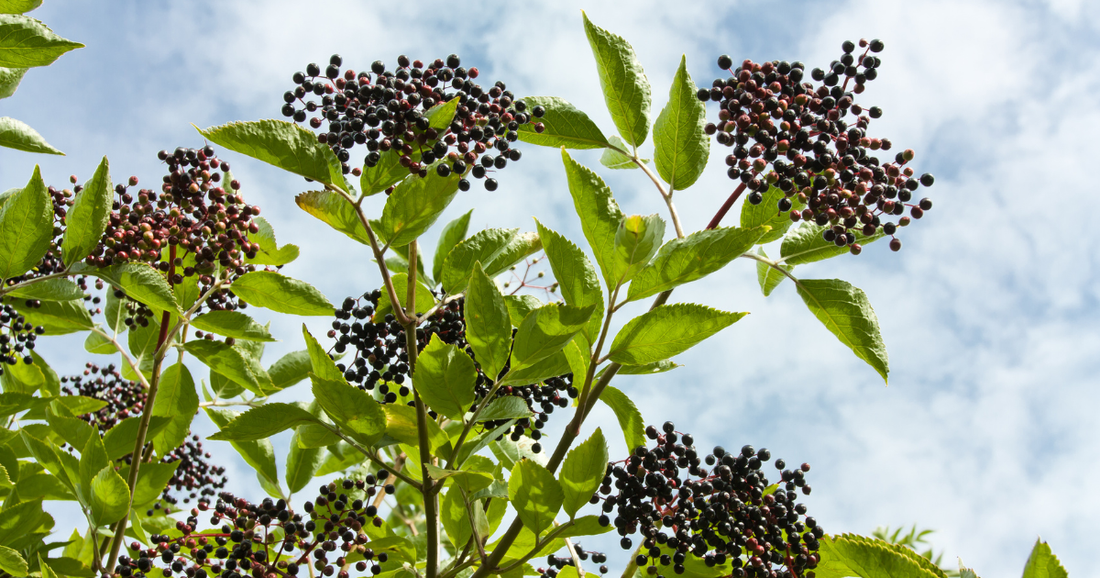
Herbal Spotlight: Elderberry — Nature’s Cold & Flu Ally
Share
The Little Berry with Big Healing Power
If there’s one herb that deserves its “household staple” status, it’s elderberry (Sambucus nigra). For generations, this dark, jewel-toned berry has been trusted to keep families healthy during cold and flu season — and for good reason. It’s not just an old wives’ tale or trendy syrup; elderberry has real, science-backed benefits that line up beautifully with what herbalists have known for centuries.
Elderberry supports the body’s natural defenses, helps shorten the duration of illness, and soothes those achy, worn-down feelings that come with colds and flu. It’s one of those rare herbs that’s both gentle enough for kids and powerful enough to hold its own against viral season chaos.
If you missed my post on Winter Wellness: Herbal Remedies to Boost Your Immunity and Beat the Cold & Flu, I go a bit deeper into other herbs that work beautifully alongside elderberry for full-body support.
A Bit of History: Elderberry’s Traditional Roots
Elderberry isn’t new on the wellness scene — not by a long shot. It’s been a go-to in European folk medicine for hundreds (if not thousands) of years. Hippocrates himself called the elder tree his “medicine chest,” and for good reason. Traditional healers used nearly every part of the plant — the berries, flowers, and even bark — for everything from fevers and infections to sore throats and seasonal congestion.
In old herbal texts, elderberry was known for its ability to “move stagnation” — helping the body clear out what it no longer needs. Whether it was used as a warm tea, a syrup, or a soothing wine, elderberry was viewed as a purifier and protector — a way to strengthen the body before illness ever took hold.
Why Elderberry Works So Well for Colds and Flu
Elderberry’s secret weapon is its combination of flavonoids, antioxidants, and antiviral compounds — particularly anthocyanins, which give the berries their deep purple color. These compounds help block viruses from attaching to and entering healthy cells, which is one reason elderberry is so effective when used at the first sign of illness.
Here’s what makes elderberry stand out:
- Antiviral properties: Studies suggest elderberry may help reduce the duration and severity of viral infections, including influenza and certain coronaviruses.
- Immune support: Elderberry modulates immune function — meaning it helps the body respond appropriately, not excessively.
- Anti-inflammatory effects: It helps reduce the aches, pains, and fatigue that often tag along with colds and flu.
- Rich in vitamins and minerals: Especially vitamin C, vitamin A, and iron, all of which support overall wellness and recovery.
In short, elderberry doesn’t “fight” the body — it works with it, encouraging a faster, smoother recovery while helping to prevent future infections. That’s holistic healing at its best.
Ways to Use Elderberry
There are lots of ways to bring elderberry into your routine, depending on what feels easiest for you:
- Elderberry Syrup: The classic form — sweet, tasty, and great for kids or adults. You can take a spoonful daily during cold season or every few hours when you’re under the weather.
- Elderberry Tea: Perfect for when you’re feeling run down. Combine with herbs like echinacea, ginger, or cinnamon for an extra immune boost.
- Tincture: A concentrated form that’s easy to take on the go — ideal for those who don’t love sweet syrups.
- Capsules or Gummies: A convenient option for those who prefer pre-measured doses (just make sure they’re made with real elderberry extract, not artificial flavoring).
One quick note: Elderberries must always be cooked before use. Raw berries, leaves, and stems contain small amounts of cyanogenic glycosides, which can cause nausea or stomach upset. A good simmer takes care of that completely, so stick with properly prepared syrups, tinctures, or dried berries.
A Seasonal Ally Worth Keeping Year-Round
Even though elderberry shines brightest in cold and flu season, it’s a wonderful year-round tonic for immune resilience. Many herbalists (myself included) take small doses throughout the fall and winter months as a preventive, then shift to “as needed” use once spring rolls around.
The beauty of elderberry is that it doesn’t just chase symptoms — it helps the body stay strong enough to avoid them altogether. It’s a perfect example of what I love most about herbal medicine: it’s not about taking over your body's processes; it’s about supporting them.
Whether you make your own elderberry syrup on the stovetop or keep a bottle ready in the fridge for busy days, this humble berry is a powerful ally. It’s stood the test of time for a reason, and modern research is only confirming what traditional healers have known all along.
If you’re looking for a gentle, effective way to strengthen your immune system this season, start with elderberry. It’s one of nature’s sweetest ways to stay well.
